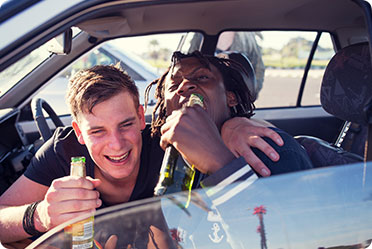
If you had read, “How to Avoid a DUI During the Holidays-Part 1,” then hopefully you steered clear of drunk driving during the Thanksgiving holiday. Nonetheless, this is the time of year when Christmas holiday parties are abundant and so is the alcohol being served at those parties. This article outlines four more tips that should be kept in mind in order to avoid a DUI.
Tip 5: Don’t drink alcohol if you are driving. This is the surest way not to get charged with a DUI. (Refer to Tip 1).
Tip 6: If you decided to drink and then believe that you had too much alcohol to drive, “sleeping it off” inside a car could result in a DUI charge.
Police officers commonly come across drivers who are sleeping in their cars until they become sober. Often, a driver has turned on the ignition in order to listen to music or use the heater/air conditioner before falling asleep. The police will likely charge the driver with a DUI. In these cases, the prosecution may assert that the driver had operated the vehicle prior to encountering the police, intended to operate the vehicle or was in control of the vehicle while in an intoxicated state.
A knowledgeable DUI attorney will argue, by using certain exceptions in the law, that the prosecution cannot prove the driver “operated” the vehicle. Nonetheless, being sensible and having someone drive you home or to a hotel is the surest way to avoid a misunderstanding with the police.
Tip 7: Make sure that a police officer knows about physical problems or injuries you have if asked to perform field sobriety tests.
Simply drinking alcohol and driving while not intoxicated is not against the law. However, even a driver who is not intoxicated may be investigated by the police if the odor of an alcoholic beverage is detected during a routine traffic stop.
In most DUI investigations, a driver will be asked to perform field sobriety tests. Some of the typical field sobriety tests administered require balance and coordination, such as lifting one leg for 30 seconds or walking heel-to-toe. If you have a physical problem or injury that affects your balance, then you should inform the officer immediately. The officer may then choose to administer tests that do not require balance and coordination, such as reciting the alphabet or counting backwards.
Tip 8: Refusing to give a breath or blood sample is usually a bad idea.
After a driver has been arrested for a suspected DUI, a police officer will request the driver to provide a breath, blood or urine sample. In Pennsylvania, if the driver refuses to provide a blood, breath or urine sample upon request, then the penalties associated with the “refusal” will increase exponentially. The increased penalties include more time in jail, a longer license suspension, and increased fines. In New Jersey, if the driver refuses to provide a breath sample, then the increased penalties will include a longer license suspension, increased fines and additional surcharges.
The holiday season is a joyous time of year. Making a call to a friend or family member to pick you up from the local police station is the last thing you will want to do. Hopefully, these tips will help you to avoid putting others and youself in harm’s way.
For more information, contact Kevin Leckerman at (856) 429-2323.
Leckerman Law focuses on safeguarding the
rights of individuals charged with DUI, DWI, DAI, and
other alcohol-related criminal offenses - Call Us Now For
NJ DWI (856) 429-2323 | For PA DUI (215) 496-9292